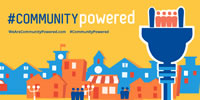Energy Innovator Award
Each year the American Public Power Association presents the Demonstration of Energy & Efficiency Development (DEED) Energy Innovator Award to recognize utility programs that have demonstrated advances in the development or application of creative, energy-efficient techniques or technologies, provide better service to electric customers, or projects that increase the efficiency of utility operations or resource efficiency. Judging criteria also includes transferability and takes into account project scope in relation to utility size. PWC has received the Energy Innovator Award three times.
2019
Developed an innovative way to locate electrical faults in its electricity distribution system, allowing PWC to limit outage durations, reduce callouts, and enhance the quality of life for its community. Now, PWC customers know that any outages will be taken care of as quickly as possible. Improved reliability has resulted in savings on labor costs, vehicle maintenance, fuel, vegetation management, and electrical component maintenance.
2012
Developed the Voltage-Drop Calculator, a tool that could potentially help customers and utilities save on energy costs. The calculator simplified the evaluation of the impact customer equipment had on the electric system and provided information to better manage the customer’s impact on system reliability and power quality. As a result, it could potentially reduce energy costs for the utility and customers. In addition to benefiting its customers, PWC also shared the tool with smaller municipal electric systems across the country who may not have had the resources to provide similar services.
2010
Launched the Energy Management ($martWorks) Program, a partnership between PWC, Consert, Inc., IBM, and Verizon Wireless to create a customer interface that made it easy for electric customers to control their energy usage. Initially, 100 electric customers were selected to participate in the program. They received a smart electric meter, programmable thermostat, and controllers for each controlled device (HVAC units, water heaters, etc.). The participants created multiple customized energy programs to manage their electric energy consumption and becoming more conscious of their energy usage. The benefits to PWC included reduction in energy usage, improved demand forecasting, interactive communication with customers, real-time notification of isolated outages, and reduced carbon consumption and emissions.
Years Received
- 2019
- 2012
- 2010









